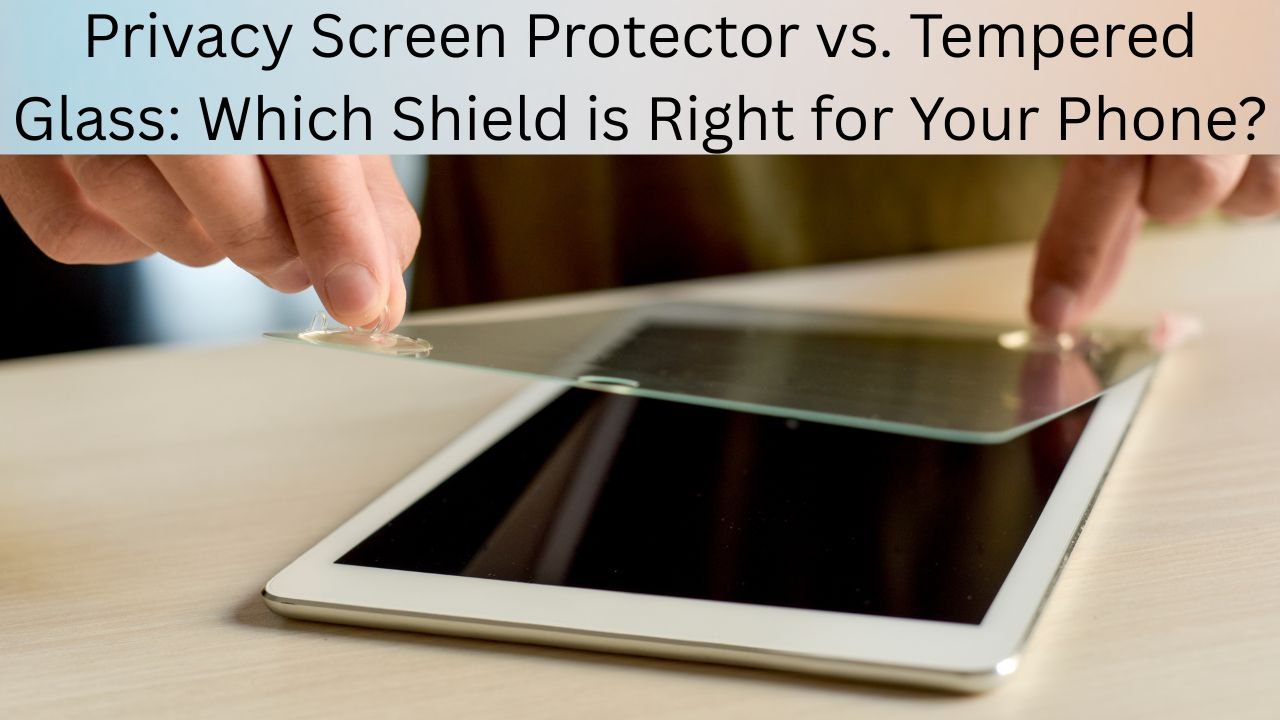Introduction – Your Choice Depends on Lifestyle
Choosing between a Privacy Screen Protector vs. Tempered Glass isn’t about which one is universally “better.” It depends on your habits, environment, and budget. If you’re often using your phone in public, privacy screens might seem like a lifesaver. But if you love vibrant displays and gaming clarity, tempered glass could be the clear winner.
By the end of this comprehensive guide, you’ll be equipped to confidently select the screen protector that aligns perfectly with your privacy needs, viewing habits, and budget.
What Is Regular Tempered Glass?
Tempered glass is a multi-layered screen protector created by heating glass and cooling it rapidly to increase strength. Its 9H hardness rating means it’s tough enough to resist scratches from common items like keys or coins in your pocket. When it does break, it shatters into blunt, harmless pieces instead of sharp shards.
For a quick comparison with newer options, see how ceramic screen protectors differ from tempered glass.
Pros of Regular Tempered Glass
- Superior Impact Protection: Absorbs drops and protects your phone’s original screen.
- Best clarity on smartphones: Perfect for watching high-resolution videos, gaming, or photo editing without visual distortion.
- Excellent Touch Sensitivity: Feels like your phone’s original glass.
- Scratch Resistance: Keeps screen looking new even with heavy daily use.
- Affordable & Easy to Find: Available everywhere and in many price ranges.
Cons of Regular Tempered Glass
- No Privacy: Your screen is visible from all angles.
- Sacrificial Protection: If dropped hard, it will crack and need replacing.
- Installation Issues: Without proper alignment, bubbles or dust can get trapped.
What Is a Privacy Screen Protector?
A privacy screen protector is a tempered glass (or plastic) protector with an added privacy filter layer. It blocks side angles, so people sitting next to you only see a dark screen.
How Does It Work?
It uses micro-louver technology, similar to Venetian blinds, to limit visibility to within 30–45 degrees from the front. If someone tries to peek from the side, they see a black or shadowed screen.
Pros of Privacy Screen Protectors
- Enhanced Privacy: Stops “shoulder surfers” from seeing personal data, banking apps, or private chats.
- Dual Protection: Provides impact resistance like regular tempered glass.
- Anti-Glare Features: Some reduce reflections in bright light. For stronger glare protection, check anti-glare screen protectors.
- Optional Blue Light Filtering: Helps reduce eye strain during long use.
Cons of Privacy Screen Protectors
- Reduced Screen Brightness: You’ll likely increase brightness, which drains battery faster.
- Narrow Viewing Angle: Even you may find it tricky to share videos with friends nearby.
- Grainy or Rainbow Effects: Low-quality versions can distort clarity.
- Impact on Face ID or Fingerprint Sensors: Some users report slower or inaccurate unlocking, especially in low light.
- Higher Cost: Typically pricier than regular glass.
- Vertical Privacy Gap: Most only block side views, not over-the-shoulder spying.
Privacy Screen vs. Regular Tempered Glass – Direct Comparison
Here’s a side-by-side breakdown to help you decide quickly:
| Feature | Regular Tempered Glass | Privacy Screen Protector |
| Primary Benefit | Scratch & drop protection | Privacy + protection |
| Screen Visibility | Clear from all angles | Darkened at 30–45° angles |
| Brightness | Original screen brightness | Reduces brightness (battery impact) |
| Clarity | Crystal clear | Slight graininess possible |
| Touch Sensitivity | No impact | Slight impact on in-display sensors |
| Cost | Lower | Higher |
| Sharing Content | Easy | Hard to share from side views |
| Ideal User | Gamers, content lovers, budget users | Privacy-focused, public phone users |
Key Trade-offs
The main battle here is privacy vs. visual quality. Privacy screens give you discretion but dim your display. Regular tempered glass keeps your phone bright and sharp but leaves your data visible to anyone nearby. Cost is another factor: privacy screens cost more due to their layered tech.
Who Should Choose Which?
Who Needs a Privacy Screen Protector?
- People checking banking apps or confidential emails in public.
- Professionals using sensitive documents or work data on commutes.
- Those uncomfortable with shoulder surfing in crowded places.
- Travelers or commuters who need discretion on buses, flights, or cafes.
Who Is Better Off with Regular Tempered Glass?
- Gamers or binge-watchers needing vibrant colors and max clarity.
- People who often share screens with friends or colleagues.
- Charging while navigating (privacy dimming can be unsafe).
- Budget-conscious users who want simple and reliable protection.
- Users with in-display fingerprint sensors who need seamless unlocks.
If neither seems perfect, you could explore hydrogel screen protectors vs. tempered glass to see if a flexible hybrid option suits your needs.
What to Look for When Buying a Screen Protector
No matter which type you choose, quality matters:
- Brand Reputation: Stick with proven names for reliable durability.
- Installation Kit: Case-friendly screen protectors to avoid bubbles.
- Case Compatibility: Choose “case-friendly” designs for edge protection.
- Oleophobic Coating: A must-have for fingerprint resistance.
- Warranty: Check if the brand offers replacements for defects.
Final Considerations Before Buying
- Check reviews focusing on clarity, brightness impact, and sensor compatibility.
- Consider your environment: If you’re often at home, privacy filters may be overkill.
- Remember that both protectors wear out over time and may need replacing yearly.
Conclusion – Your Best Screen Shield
The best screen protector isn’t universal—it’s personal. If privacy and data security in public spaces matter to you, a privacy screen protector is worth the higher price. But if you care about vibrant colors, smooth gaming, and affordable protection, regular tempered glass is the smarter pick.
Before buying, think about your daily usage patterns and how you use your phone. A little clarity on your priorities today will save you from regret later.



